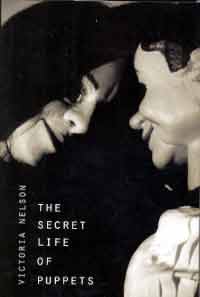
Oh, blessed puppets, receive My prayer, and teach Me to make Myself in thy image.
-- Thomas Ligotti, "Mad Night of Atonement"
It feels wrong to me somehow that a book published in the year 2000 with the name "The Secret Life of Puppets" which deals with simulacra and demiurges, fantasy in European high art and American pulp fiction, and Bruno Schulz and H.P. Lovecraft doesn't once mention Ligotti, but perhaps it's just me.
Anyway, I found the book fascinating and thought-provoking, even though I found myself mostly skeptical of the author's conclusions. The argument here is that after the Enlightenment, Platonic thinking has been largely relegated to the background, a consequence of which is that Aristotelian, empirical philosophies have pretty much dominated ever since. However, Platonism and transcendental philosophies provide people with a sense of connection to the greater cosmos, which has been lost in our embrace of rational materialism. Platonic and neo-Platonic thought has found an outlet in culture, both high and low, and the recent conflation of neo-Platonism with technology (as exemplified in movies like "The Matrix") shows that we may be on the verge of a great return of Platonism or new religious reawakening.
As I said, it's an intriguing thesis, and I must admit I find myself mostly in agreement, at least with the way pop culture and art have adopted some of the roles/functions that used to be exclusive domains of religion. But I'm skeptical about the notion of the reawakening. The Matrix and its sequels have come and gone, and we've lost a large part of our obsession with virtual worlds. I'm almost tempted to bring out the old cliché of "9/11 changed everything," which like all clichés does have some element of truth. Anxiety and mystification of technology have been replaced by more conventional anxieties of violence by cultural outsiders. Of course, Nelson had no way of knowing that the western world would receive such a large shock, but at least for the moment the nature of cultural anxieties has shifted.
Another (lesser) criticism is the Lovecraft chapter, which I found interesting but pretty flawed. Nelson appears to be wanting to engage in a psychiatric reading of Lovecraft, which I could understand, but she relies too heavily on some broad generalizations. The impression I get is that Nelson is just trying to hard to find evidence of schizophrenia or syphillis trauma and is cherry-picking from Lovecraft's fiction to do so.
Those complaints aside, the book presents an intriguing look at philosophies of gnosticism and hermeticism, and their expression in popular culture and high art, as well as the way those have developed over the years. Nelson's approach has a certain playful ecclecticism, which is fun to read even when it's not entirely convincing.



No comments:
Post a Comment